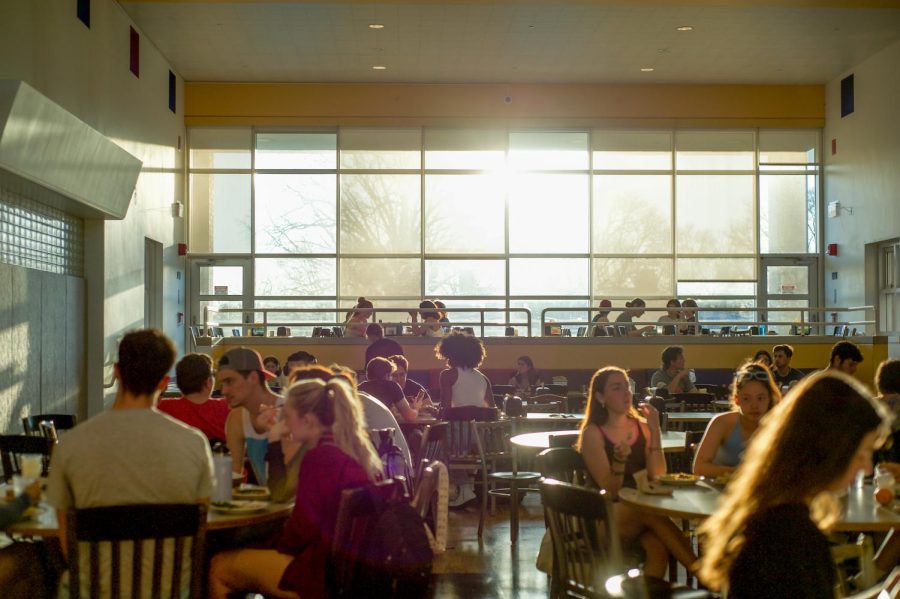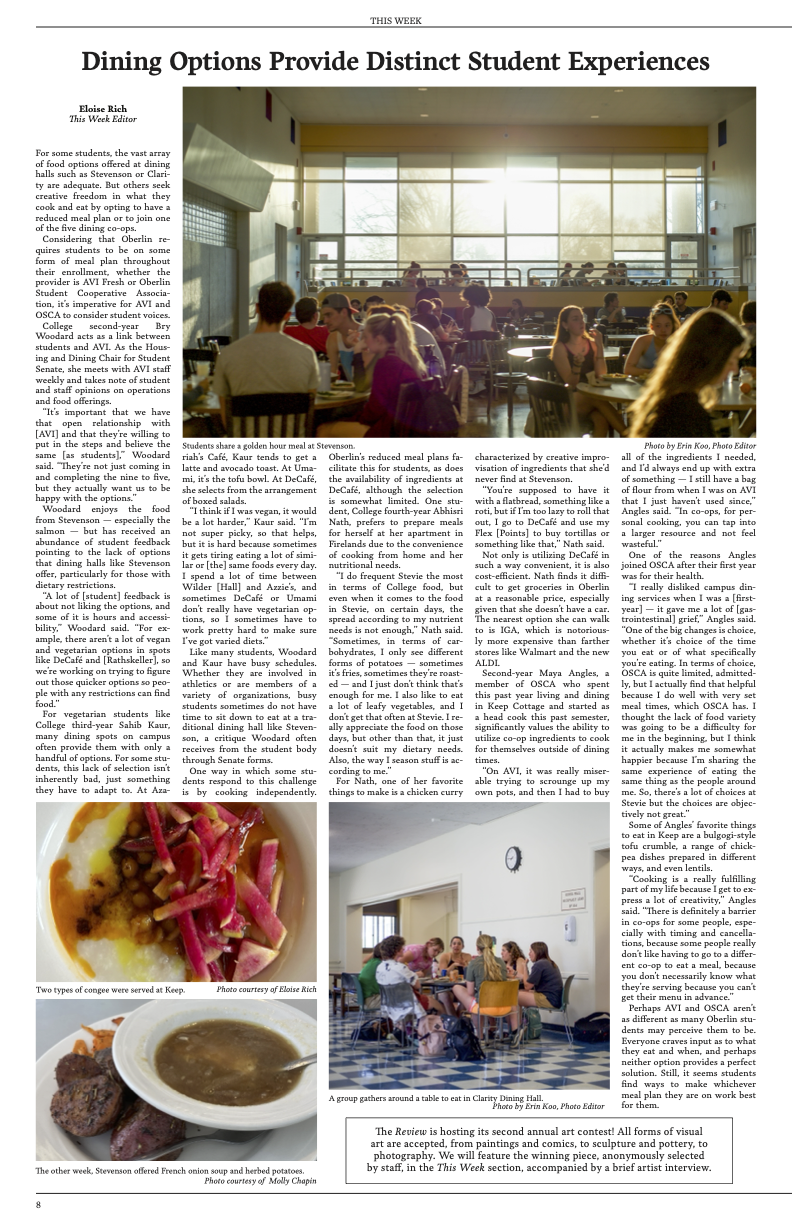Dining Options Provide Distinct Student Experiences
Students share a golden hour meal at Stevenson.
For some students, the vast array of food options offered at dining halls such as Stevenson or Clarity are adequate. But others seek creative freedom in what they cook and eat by opting to have a reduced meal plan or to join one of the five dining co-ops.
Considering that Oberlin requires students to be on some form of meal plan throughout their enrollment, whether the provider is AVI Fresh or Oberlin Student Cooperative Association, it’s imperative for AVI and OSCA to consider student voices.
College second-year Bry Woodard acts as a link between students and AVI. As the Housing and Dining Chair for Student Senate, she meets with AVI staff weekly and takes note of student and staff opinions on operations and food offerings.
“It’s important that we have that open relationship with [AVI] and that they’re willing to put in the steps and believe the same [as students],” Woodard said. “They’re not just coming in and completing the nine to five, but they actually want us to be happy with the options.”
Woodard enjoys the food from Stevenson — especially the salmon — but has received an abundance of student feedback pointing to the lack of options that dining halls like Stevenson offer, particularly for those with dietary restrictions.
“A lot of [student] feedback is about not liking the options, and some of it is hours and accessibility,” Woodard said. “For example, there aren’t a lot of vegan and vegetarian options in spots like DeCafé and [Rathskeller], so we’re working on trying to figure out those quicker options so people with any restrictions can find food.”
For vegetarian students like College third-year Sahib Kaur, many dining spots on campus often provide them with only a handful of options. For some students, this lack of selection isn’t inherently bad, just something they have to adapt to. At Azariah’s Café, Kaur tends to get a latte and avocado toast. At Umami, it’s the tofu bowl. At DeCafé, she selects from the arrangement of boxed salads.
“I think if I was vegan, it would be a lot harder,” Kaur said. “I’m not super picky, so that helps, but it is hard because sometimes it gets tiring eating a lot of similar or [the] same foods every day. I spend a lot of time between Wilder [Hall] and Azzie’s, and sometimes DeCafé or Umami don’t really have vegetarian options, so I sometimes have to work pretty hard to make sure I’ve got varied diets.”
Like many students, Woodard and Kaur have busy schedules. Whether they are involved in athletics or are members of a variety of organizations, busy students sometimes do not have time to sit down to eat at a traditional dining hall like Stevenson, a critique Woodard often receives from the student body through Senate forms.
One way in which some students respond to this challenge is by cooking independently. Oberlin’s reduced meal plans facilitate this for students, as does the availability of ingredients at DeCafé, although the selection is somewhat limited. One student, College fourth-year Abhisri Nath, prefers to prepare meals for herself at her apartment in Firelands due to the convenience of cooking from home and her nutritional needs.
“I do frequent Stevie the most in terms of College food, but even when it comes to the food in Stevie, on certain days, the spread according to my nutrient needs is not enough,” Nath said. “Sometimes, in terms of carbohydrates, I only see different forms of potatoes — sometimes it’s fries, sometimes they’re roasted — and I just don’t think that’s enough for me. I also like to eat a lot of leafy vegetables, and I don’t get that often at Stevie. I really appreciate the food on those days, but other than that, it just
doesn’t suit my dietary needs. Also, the way I season stuff is according to me.”
For Nath, one of her favorite things to make is a chicken curry characterized by creative improvisation of ingredients that she’d never find at Stevenson.
“You’re supposed to have it with a flatbread, something like a roti, but if I’m too lazy to roll that out, I go to DeCafé and use my Flex [Points] to buy tortillas or something like that,” Nath said.
Not only is utilizing DeCafé in such a way convenient, it is also cost-efficient. Nath finds it difficult to get groceries in Oberlin at a reasonable price, especially given that she doesn’t have a car. The nearest option she can walk to is IGA, which is notoriously more expensive than farther stores like Walmart and the new ALDI.
Second-year Maya Angles, a member of OSCA who spent this past year living and dining in Keep Cottage and started as a head cook this past semester, significantly values the ability to utilize co-op ingredients to cook for themselves outside of dining times.
“On AVI, it was really miserable trying to scrounge up my own pots, and then I had to buy all of the ingredients I needed, and I’d always end up with extra of something — I still have a bag of flour from when I was on AVI that I just haven’t used since,” Angles said. “In co-ops, for personal cooking, you can tap into a larger resource and not feel wasteful.”
One of the reasons Angles joined OSCA after their first year was for their health.
“I really disliked campus dining services when I was a [first-year] — it gave me a lot of [gastrointestinal] grief,” Angles said. “One of the big changes is choice, whether it’s choice of the time you eat or of what specifically you’re eating. In terms of choice, OSCA is quite limited, admittedly, but I actually find that helpful because I do well with very set meal times, which OSCA has. I thought the lack of food variety was going to be a difficulty for me in the beginning, but I think it actually makes me somewhat happier because I’m sharing the same experience of eating the same thing as the people around me. So, there’s a lot of choices at Stevie but the choices are objectively not great.”
Some of Angles’ favorite things to eat in Keep are a bulgogi-style tofu crumble, a range of chickpea dishes prepared in different ways, and even lentils.
“Cooking is a really fulfilling part of my life because I get to express a lot of creativity,” Angles said. “There is definitely a barrier in co-ops for some people, especially with timing and cancellations, because some people really don’t like having to go to a different co-op to eat a meal, because you don’t necessarily know what they’re serving because you can’t get their menu in advance.”
Perhaps AVI and OSCA aren’t as different as many Oberlin students may perceive them to be. Everyone craves input as to what they eat and when, and perhaps neither option provides a perfect solution. Still, it seems students find ways to make whichever meal plan they are on work best for them.



